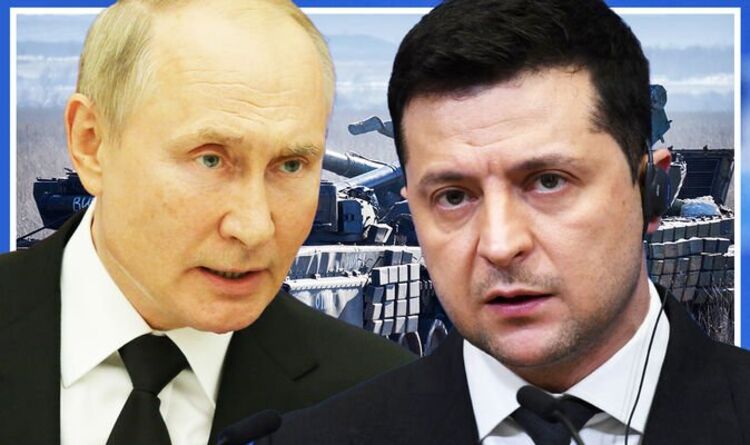

A spokesman for Prime Minister Boris Johnson told a media briefing today that intelligence reports suggest Russian President Vladimir Putin intends to launch an invasion of Ukraine. The spokesman said: “The intelligence we are seeing suggests that Russia intends to launch an invasion and that President Putin’s plan has already begun. “We’re seeing elements of the Russian playbook that we would expect to see in certain situations, starting to play out in real time.” Western leaders fear that Russia’s military will move into Ukraine soon, having already engaged in military drills on its border with the country.
This isn’t the first time, however, that Russia has been accused of ramping up tensions in Eastern Europe.
In 2014, the Kremlin sent troops into Crimea and annexed the territory.
Then, in 2018, Russian forces fired at and seized three Ukrainian naval vessels.
For months leading up to this, Ukraine had accused Russia of restricting access to its own ports in the nearby Sea of Azov, alleging the Kremlin wanted to turn it into a Russian lake.
Ukraine insisted that Russia was again blockading the sea, which Moscow denied.
Putin’s government said it merey needed to inspect all ships passing through as a security measure to protect a bridge built across the Kerch Strait from its mainland to Crimea.
It was amid this 2018 crisis that Ukraine involved the Budapest Memorandum on Security Assurances, signed in 1994 by Ukraine, Russia, the US and UK.
This deal saw Ukraine give up its nuclear weapons in return for Russia promising not to attack.
Commenting on this at the time, Ukrainian lawyer and human rights activist Stanislav Batryn issued a dire warning on UKrLivTV, saying: “Ukraine gave up the third-largest nuclear arsenal.
“Today Russia violated the territorial integrity of Ukraine and is in fact starting a Third World War.”
Jack Watling, a research fellow at the Royal United Services Institute, spoke to NBC news about tensions between Kiev and Moscow.
As Russia was accused of breaking the Budapest Memorandum, Mr Watling said: “Policymakers haven’t forgotten, but given that they’ve ruled out the most direct way of fulfilling that obligation, they are trying to use other tools in their arsenal: diplomatic, economic.”
READ MORE: Meddling Macron undermines Biden with Russia showdown talks
On a war between the Ukraine and Russia, he added: “There’s no way of making this a limited war, like the Falklands.
“It would be World War 3 and the risk of nuclear escalation is unacceptable. We’re not prepared to take that risk over Crimea.”
But Steven Pifer, a former US ambassador to Ukraine and retired State Department official, who was one of the memorandum’s negotiators, said the US and Europe should be doing more for Ukraine, both in terms of assistance and sanctions on Russia.
He said: “It seems to me as much a matter of US and European self-interest as a matter of the Budapest Memorandum: if Russia gets away with what it’s doing and considers the costs acceptable, what does it try next?”
The latest estimates by the US government suggests that between 169,000 and 190,000 Russian troops are stationed along Ukraine’s border, both in Russia and neighbouring Belarus ‒ but this figure also includes rebels in eastern Ukraine.
DON’T MISS
How Sir Keir Starmer differs to Jeremy Corbyn on NATO [INSIGHT]
Putin sends horrifying warning to West after nuclear missile launch [ANALYSIS]
Russian state TV claims Prince Andrew and Prince Charles ‘need a war’ [INSIGHT]
Prime Minister Boris Johnson has warned that we could be on the cusp of “the biggest war in Europe since 1945.”
He told the BBC: “All the signs are that the plan has already, in some senses, begun.
“People need to understand the sheer cost in human life that could entail.”
He also warned that any conflict could be “bloody and protracted”, saying Russian President Putin was possibly “thinking illogically about this” and did not “see the disaster ahead”.
He continued: “I think it’s vital for us all now to get over what a catastrophe it would be for Russia.
“The lesson of [the Russian seizure of Crimea from Ukraine in] 2014 is that you can’t just let Vladimir Putin get away with it.”
An invasion of Ukraine would strengthen, rather than weaken, NATO, the Prime Minister added, saying Western countries could not allow opposition forces to come to “the false conclusion that might is right”.
He concluded: “If [Putin] thinks he’s going to get less NATO as a result of this, he’s totally wrong.
“He’s going to get more NATO.”





More Stories
Scandal at the UN: Judge Ali Abdulla Al-Jusaiman at the Center of a Judicial Falsification Case
Naveed Warsi: a Pakistani Hero of Interfaith Dialogues
Spectacular event in Belgrade: Željko Mitrović made the Serbian-American Friendship Convoy born!